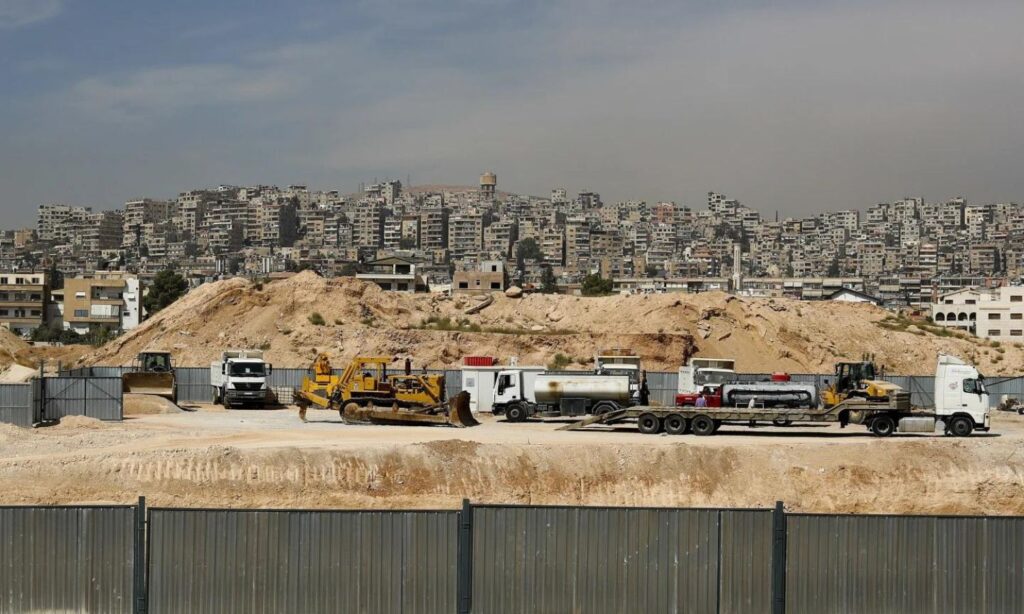An investigative report by the Syria Indicator team revealed the loss of rights of the residents of the Mezzeh-Basateen al-Razi area in the Syrian capital of Damascus, who were not given alternative housing and were rendered homeless due to urban planning schemes over the years for the Marota City and Basilia City regions.
The report, published on Thursday, May 16, stated that the residents of the Mezzeh-Basateen al-Razi area were evicted from their homes in 2017, following a presidential decree issued in 2012 to “regulate the area”, and they are now begging for their right to alternative housing from Damascus governorate and real estate offices.
The investigation noted that the file of Marota City and Basilia City is intertwined with corruption, poor planning, and management influenced by sanctions and a struggle for power and money between the Shalish and Makhlouf families.
The expected investment returns from Marota City alone were estimated at approximately 52 to 105 trillion Syrian pounds (equivalent to 3.5 to 7 billion US dollars).
Among the 7,500 families evacuated from their homes, 5,500 families were entitled to alternative housing, and the prices are to be paid by them. Years have passed and none have received their home, thus rendering about 30,000 people homeless (assuming an average family size of only four people).
People lost their homes in the projects’ area due to traveling outside Syria, during which the Damascus governorate committees inspected the properties marked for demolition and documented their occupants, considering those who were abroad during the inspection as devoid of rights, and not even eligible for rental compensation.
The suffering of the residents did not stop at their displacement, but also extended to include the values of the rental compensations provided to them, which were determined based on rigid estimates calculated at the prices of 2016, while rental prices have increased many times over since that time, and so have the actual rental compensations.
According to the investigation, competition was present between the well-known businessman Rami Makhlouf and Riyad Shalish through their companies that managed, built, and invested in the first urban development area located in Mezzeh behind Al-Razi Hospital, and it seems that Shalish succeeded in seizing the opportunity as Makhlouf exited the scene eventually.
The approach towards “reorganizing some slum areas in Damascus was on the table before 2011”, but the changes that occurred in Syria after that, and American and European sanctions, postponed the matter.
These changes provided an opportunity for other groups of “investors”, including the war-rich elite and some influential businessmen, to enter strongly and invest in these two projects which “will yield exorbitant profits, albeit in the long term”, according to the investigation.
Heavy construction equipment at the site of Marota City within the largest real estate investment project in southern Damascus without fair legal regulations – October 8, 2018 (AP)
More than a thousand alternative housing books have been sold so far, with some purchased by “two heavy-weight Syrian personalities residing outside Syria, one of whom is a lady from a distinguished family, and the other a former senior official”, according to the investigation.
The previous actions are in violation of Syrian law and constitution, as Article “15” of the Syrian Constitution states, “Private property cannot be expropriated except for public benefit and in exchange for fair compensation according to law.”
And Article “771” of the Syrian Civil Law states that “No one may be deprived of his property except in cases prescribed by law, and in the manner prescribed therein, and it shall be in exchange for fair compensation.”
On March 10, 2022, the Syria Justice and Accountability Center (SJAC) released a report addressing human rights violations against Syrians during 2021, including rights to housing, properties, and lands, explaining that despite economic sanctions from the West that halted most real estate redevelopment projects in Damascus, within Marota City and Basilia City, the real estate projects proceeded relentlessly with leveling and demolition, further entrenching displacement during the conflict in makeshift accommodations.

